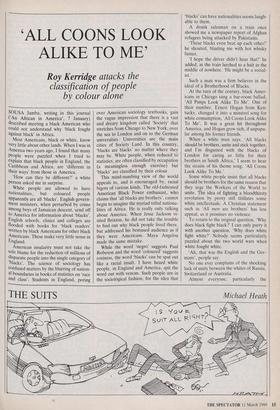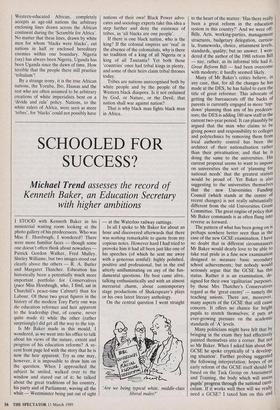'ALL COONS LOOK ALIKE TO ME'
Roy Kerridge attacks the
classification of people by colour alone
SOUSA Jamba, writing in this journal (`An African in America', 7 January) described meeting a black American who could not understand why 'black fought against black' in Africa.
Most Americans, black or white, know very little about other lands. When I was in America two years ago, I found that many People were puzzled when I tried to explain that black people in England, the Caribbean and Africa, are 'different in their ways' from those in America.
'How can they be different?' a white Person asked me in surprise. White people are allowed to have nationalities, but coloured people apparently are all 'blacks'. English govern- ment ministers, when perturbed by crime among boys of Jamaican descent, send off to America for information about 'blacks'. English schools, clinics and colleges are flooded with books for 'black readers' written by black Americans for other black Americans. These make very little sense in England.
American insularity must not take the sole blame for the reduction of millions of disparate people into the single category of blacks'. The science of sociology has confused matters by the blurring of nation- al boundaries in books of statistics on 'race and class'. Students in England, poring over American sociology textbooks, gain the vague impression that there is a vast and dreary kingdom called 'Society' that stretches from Chicago to New York, over the sea to London and on to the German universities. Universities are the main cities of Society Land. In this country, 'blacks are blacks' no matter where they may be. White people, when reduced to statistics, are often classified by occupation (a meaningless enough exercise) but 'blacks' are classified by their colour.
This mind-numbing view of the world appeals to, and is encouraged by, racial bigots of various kinds. The old-fashioned American Black Power enthusiast, who claims that 'all blacks are brothers', cannot begin to imagine the myriad tribal nationa- lities of Africa. He is really only talking about America. When Jesse Jackson vi- sited Brixton, he did not take the trouble to find out why black people lived there, but addressed his bemused audience as if they were Americans. Maya Angelou made the same mistake.
While the word 'negro' suggests Paul Robeson and the word 'coloured' suggests cosiness, the word 'blacks' can be spat out like a racial insult. I have heard white people, in England and America, spit the word out with venom. Such people are in the sociological fashion, for the idea that 'blacks' can have nationalities seems laugh- able to them.
A drunk salesman on a train once showed me a newspaper report of Afghan refugees being attacked by Pakistanis.
'These blacks even beat up each other!' he shouted, blasting me with hot whisky fumes.
'I hope the driver didn't hear that!' he added, as the train lurched to a halt in the middle of nowhere. 'He might be a social- ist.'
Such a man was a firm believer in the ideal of a Brotherhood of Blacks.
At the turn of the century, black Amer- icans in Chicago sang a bar-room ballad, 'All Pimps Look Alike To Me'. One of their number, Ernest Hogan from Ken- tucky, changed it into a minstrel song for white consumption, 'All Coons Look Alike To Me'. It was a great hit throughout America, and Hogan grew rich, if unpopu- lar among his former friends.
When a white man says, 'All blacks should be brothers, unite and stick together, and I'm disgusted with the blacks of London for caring so little for their brothers in South Africa,' I seem to hear the strains of his theme song: 'All Coons Look Alike To Me.'
Some white people insist that all blacks should be brothers for the same reason that they urge the Workers of the World to unite. The idea of fighting a bloodthirsty revolution by proxy still titillates some white intellectuals. A Christian statement such as 'All men are brothers' has less appeal, as it promises no violence.
To return to the original question, 'Why does black fight black?' I can only parry it with another question, 'Why does white fight white?' Nobody seems particularly puzzled about the two world wars when white fought white.
`Ah, that was the English and the Ger- mans', people say.
No one ever complains of the shocking lack of unity between the whites of Russia, Switzerland or Australia.
Almost everyone, particularly the Western-educated African, completely accepts as age-old nations the arbitrary enclosing lines drawn across the African continent during the 'Scramble for Africa'. No matter that these lines, drawn by white men for whom 'blacks were blacks', cut nations in half or enclosed hereditary enemies within one boundary. Nigeria (say) has always been Nigeria, Uganda has been Uganda since the dawn of time. How terrible that the people there still practice `tribalism'!
By a strange irony, it is the true African nations, the Yoruba, Ibo, Hausas and the rest who are often assumed to be arbitrary creations of white imperialists bent on a 'divide and rule' policy. Nations, to the white rulers of Africa, were seen as mere 'tribes', for 'blacks' could not possibly have nations of their own! Black Power advo- cates and sociology experts take this idea a step further and deny the existence of tribes, as `all blacks are one people'.
If there is one black nation, who is the king? If the colonial empires are 'real' in the absence of the colonialists, why is there no tradition of a king of all Nigeria or a king of all Tanzania? Yet both those 'countries' once had tribal kings in plenty, and some of their heirs claim tribal thrones today.
Tribes are nations unrecognised both by white people and by the people of the Western black diaspora. Is it not ordained by God, or Nature, or the Devil, that nation shall war against nation?
That is why black man fights black man in Africa.



























































 Previous page
Previous page